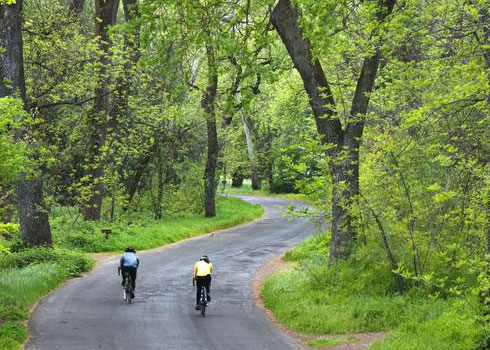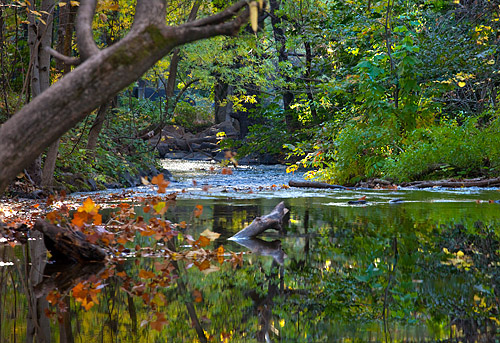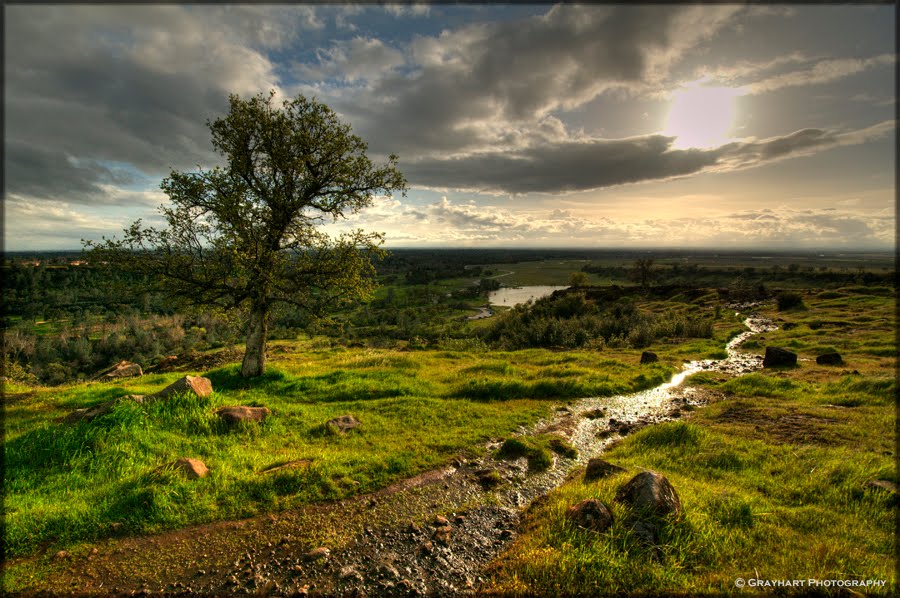Despite the chill, damp and heavy, rain-bearing clouds, I manage a not too uncomfortable hour-long sitting a quarter mile downstream from Cedar Grove. It’s a strange thing to take a meditation in the middle of a mid-size city, surrounded by both nature and the din of man, but there is something fitting and necessary about doing so.
 The quarter-mile wide strip of parkland that runs through the campus and the town is its best feature, everyone who lives or visits here agrees. Bidwell Park is the legacy of Annie and John Bidwell, famous for leading one of the first emigrant parties along the California Trail. (He led the parties, and she bequeathed the park.) In the future, most cities will have a slice of unmanicured nature at their heart. After all, though it’s hardly equivalent, even New York has Central Park.
The quarter-mile wide strip of parkland that runs through the campus and the town is its best feature, everyone who lives or visits here agrees. Bidwell Park is the legacy of Annie and John Bidwell, famous for leading one of the first emigrant parties along the California Trail. (He led the parties, and she bequeathed the park.) In the future, most cities will have a slice of unmanicured nature at their heart. After all, though it’s hardly equivalent, even New York has Central Park.
Though some denizens of Chico don’t believe it, I encountered a healthy coyote once in the main section of the park. It happened after a powerful meditative state ensued from an hour’s passive observation, as I’d begun my run. I spotted something 200 meters up a path frequented by cyclists and walkers, as well as runners.
That’s not a dog, I recall thinking, and then dismissed the possibility of a coyote, a shy and wary animal I’d seen at a distance a few times in the wild. But as I rounded the turn, there it was, standing on a log only a few meters from the trail, staring at me.
Because thought was deeply quiet, I stood in wonder, transfixed by the encounter. For a full minute we stared at each other. The species barrier did not exist. There was even a moment when the man seemed to be looking through the coyote’s eyes, and the coyote seemed to be looking through the man’s eyes.
Later, at a visceral level I understood why Native Americans both revered and feared the coyote, considering him both friend and trickster. In the coyote one apparently can still experience humankind’s contradictory relationship with the earth and the other animals on it.
I turned to look at a cyclist pedaling up the broad, hard-packed path, and when I looked back, the coyote was gone.
Today, a few shafts of direct sunlight stream through the fast-thinning trees of late autumn. For the first half of the sitting I’m restless, even fidgety. But I don’t interfere with analysis and judgment of the state, and simply let it be. After a while, the observer and ‘I’ dissolve, and the body and brain grow calm and present in unforced, undirected attention.
The world, which physically is so near, suddenly seems far away. Through the fast-thinning trees, I can see cars and even buses going by. But they don’t intrude, and become part of the whole visual and aural environment.
By the end of the hour, the mind and emotions have grown very still. The intensity of beauty, timelessness and ecstasy even  produces somatic effects, rendering the body nearly motionless. One has left the stream of the known, and everything within and around is new again.
produces somatic effects, rendering the body nearly motionless. One has left the stream of the known, and everything within and around is new again.
What do these natural states of altered consciousness have to do with the world as it is?
Returning to the house I read, “In South America, the rate of depletion of vertebrate species has reached an astonishing 83 percent. This is the process that scientists have called the ‘Sixth Extinction,’ comparable to the previous five great mass extinctions on Earth. But unlike the others, the current destruction is entirely anthropogenic — a result of human activity.”
The need for wishful thinking, for seeing “many signs pointing to a great change coming and, in fact, happening now,” as a reader recently put it, is very strong. In fact, radical change is not happening, and man’s darkness is growing exponentially.
That doesn’t mean things are hopeless, as most people believe. It means we have to see things as they are if there is any possibility of changing course.
I also read a disparaging phrase about meditation—“some of us may choose to disappear into the woods or sit on a mountaintop in deep meditation.”
The writer was riffing on Rousseau, taking off from his famous quote, “Man is born free, and everywhere he is in chains.” The put-down of meditation was preceded by an absurd bit of certainty: “We now know Rousseau was dead wrong. Human evolution has made us obligate social creatures.” Rousseau was mistaken in some important ways, but that totally misses his point.
For humankind to change course there has to be a revolution in consciousness. For a psychological revolution to ignite, a sufficient but unknowable number of people have to awaken insight and grow as true in-dividuals—undivided human beings.
Wholeness and holiness (words and things that have the same root) can have relationship to the individual and humanity, but dividuals and the society s/he’s made can have no relationship to wholeness and holiness.
Martin LeFevre

